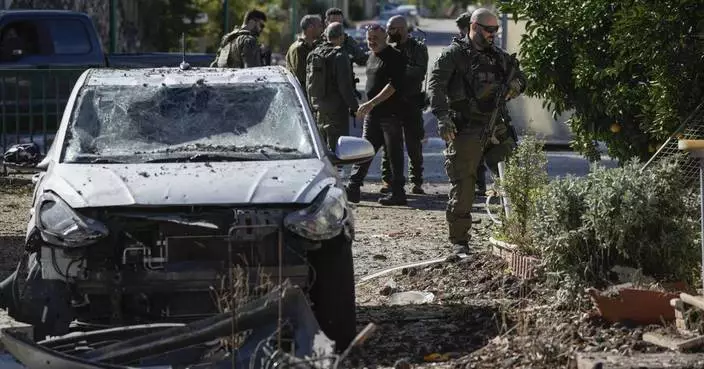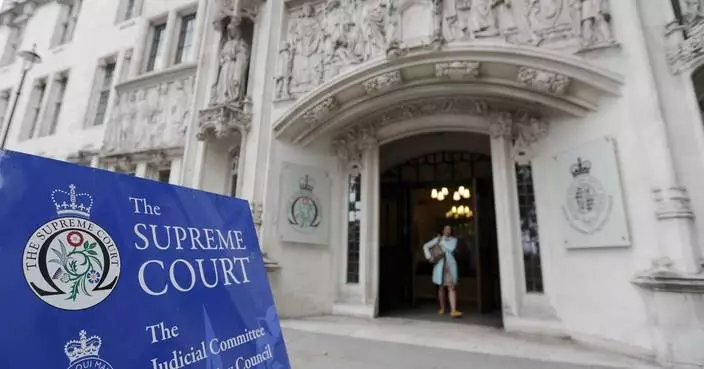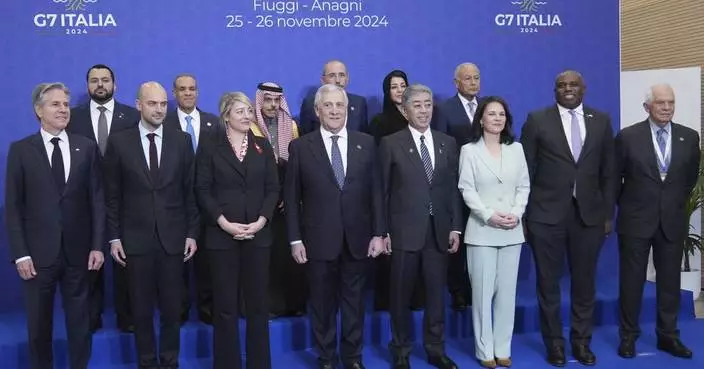WASHINGTON (AP) — President-elect Donald Trump has identified what he sees as an all-purpose fix for what ails America: Slap huge new tariffs on foreign goods entering the United States.
On Monday, Trump sent shockwaves across the nation's northern and southern borders, vowing sweeping new tariffs on Mexico, Canada, as well as China, as soon as he takes office as part of his effort to crack down on illegal immigration and drugs.
Click to Gallery
FILE - Unsold 2023 pickup trucks sit in a long row at a Ram dealership June 18, 2023, in Littleton, Colo. (AP Photo/David Zalubowski, File)
FILE - Avocados are stored in crates at a packing plant in Uruapan, Michoacan state, Mexico on Feb. 9, 2024. (AP Photo/Armando Solis, File)
FILE - Pumpjacks draw out oil and gas from well heads as wildfire smoke hangs in the air near Calgary, Alberta, Sunday, May 12, 2024. (Jeff McIntosh/The Canadian Press via AP, File)
FILE - Shipping containers are stacked at a port in Tianjin, China, Jan. 16, 2023. (AP Photo/Mark Schiefelbein, File)
FILE - GM workers use human assistance automation to weld vehicle doors at the General Motors assembly plant during the COVID-19 pandemic in Oshawa, Ontario, March 19, 2021. (Nathan Denette/The Canadian Press via AP, File)
FILE - People buy groceries at a Walmart Superstore in Secaucus, New Jersey, July 11, 2024. (AP Photo/Eduardo Munoz Alvarez, File)
In a pair of posts on his Truth Social site Trump railed against an influx of immigrants lacking permanent legal status, even though southern border apprehensions have been hovering near four-year lows.
He said he would impose a 25% tax on all products entering the country from Canada and Mexico, and an additional 10% tariff on goods from China, as one of his first executive orders.
He said the new tariffs would remain in place “until such time as Drugs, in particular Fentanyl, and all Illegal Aliens stop this Invasion of our Country!”
The president-elect asserts that tariffs — basically import taxes — will create more factory jobs, shrink the federal deficit, lower food prices and allow the government to subsidize childcare.
Economists are generally skeptical, considering tariffs to be a mostly inefficient way for governments to raise money. They are especially alarmed by Trump’s latest proposed tariffs.
Carl B. Weinberg and Rubeela Farooqi, economists with High Frequency Economics said Tuesday that energy, automobiles and food supplies will be particularly hit hard.
“Imposing tariffs on trade flows into the United States without first preparing alternative sources for the goods and services affected will raise the price of imported items at once," Weinberg and Farooqi wrote. "Since many of these goods are consumer goods, households will be made poorer.”
High Frequency Economics believes the threats are not meant to support new trade policy and are instead a tool to elicit some changes along the borders and for imports from Canada, Mexico and China.
Though Vice President Kamala Harris criticized Trump’s tariff threats as unserious during her failed bid for the presidency, the Biden-Harris administration retained the taxes the Trump administration imposed on $360 billion in Chinese goods. And it imposed a 100% tariff on Chinese electric vehicles.
Indeed, the United States in recent years has gradually retreated from its post-World War II role of promoting global free trade and lower tariffs. That shift has been a response to the loss of U.S. manufacturing jobs, widely attributed to unfettered trade and an increasingly aggressive China.
They are typically charged as a percentage of the price a buyer pays a foreign seller. In the United States, tariffs are collected by Customs and Border Protection agents at 328 ports of entry across the country.
The tariff rates range from passenger cars (2.5%) to golf shoes (6%). Tariffs can be lower for countries with which the United States has trade agreements. For example, most goods can move among the United States, Mexico and Canada tariff-free because of Trump’s US-Mexico-Canada trade agreement.
Trump insists that tariffs are paid for by foreign countries. In fact, its is importers — American companies — that pay tariffs, and the money goes to U.S. Treasury. Those companies, in turn, typically pass their higher costs on to their customers in the form of higher prices. That's why economists say consumers usually end up footing the bill for tariffs.
Still, tariffs can hurt foreign countries by making their products pricier and harder to sell abroad. Yang Zhou, an economist at Shanghai’s Fudan University, concluded in a study that Trump’s tariffs on Chinese goods inflicted more than three times as much damage to the Chinese economy as they did to the U.S. economy
By raising the price of imports, tariffs can protect home-grown manufacturers. They may also serve to punish foreign countries for committing unfair trade practices, like subsidizing their exporters or dumping products at unfairly low prices.
Before the federal income tax was established in 1913, tariffs were a major revenue driver for the government. From 1790 to 1860, tariffs accounted for 90% of federal revenue, according to Douglas Irwin, a Dartmouth College economist who has studied the history of trade policy.
Tariffs fell out of favor as global trade grew after World War II. The government needed vastly bigger revenue streams to finance its operations.
In the fiscal year that ended Sept. 30, the government is expected to collect $81.4 billion in tariffs and fees. That's a trifle next to the $2.5 trillion that's expected to come from individual income taxes and the $1.7 trillion from Social Security and Medicare taxes.
Still, Trump wants to enact a budget policy that resembles what was in place in the 19th century.
He has argued that tariffs on farm imports could lower food prices by aiding America’s farmers. In fact, tariffs on imported food products would almost certainly send grocery prices up by reducing choices for consumers and competition for American producers.
Tariffs can also be used to pressure other countries on issues that may or may not be related to trade. In 2019, for example, Trump used the threat of tariffs as leverage to persuade Mexico to crack down on waves of Central American migrants crossing Mexican territory on their way to the United States.
Trump even sees tariffs as a way to prevent wars.
“I can do it with a phone call,’’ he said at an August rally in North Carolina.
If another country tries to start a war, he said he’d issue a threat:
“We’re going to charge you 100% tariffs. And all of a sudden, the president or prime minister or dictator or whoever the hell is running the country says to me, ‘Sir, we won’t go to war.’ ”
Tariffs raise costs for companies and consumers that rely on imports. They're also likely to provoke retaliation.
The European Union, for example, punched back against Trump’s tariffs on steel and aluminum by taxing U.S. products, from bourbon to Harley-Davidson motorcycles. Likewise, China responded to Trump’s trade war by slapping tariffs on American goods, including soybeans and pork in a calculated drive to hurt his supporters in farm country.
A study by economists at the Massachusetts Institute of Technology, the University of Zurich, Harvard and the World Bank concluded that Trump’s tariffs failed to restore jobs to the American heartland. The tariffs “neither raised nor lowered U.S. employment’’ where they were supposed to protect jobs, the study found.
Despite Trump’s 2018 taxes on imported steel, for example, the number of jobs at U.S. steel plants barely budged: They remained right around 140,000. By comparison, Walmart alone employs 1.6 million people in the United States.
Worse, the retaliatory taxes imposed by China and other nations on U.S. goods had “negative employment impacts,’’ especially for farmers, the study found. These retaliatory tariffs were only partly offset by billions in government aid that Trump doled out to farmers. The Trump tariffs also damaged companies that relied on targeted imports.
If Trump’s trade war fizzled as policy, though, it succeeded as politics. The study found that support for Trump and Republican congressional candidates rose in areas most exposed to the import tariffs — the industrial Midwest and manufacturing-heavy Southern states like North Carolina and Tennessee.

FILE - Unsold 2023 pickup trucks sit in a long row at a Ram dealership June 18, 2023, in Littleton, Colo. (AP Photo/David Zalubowski, File)
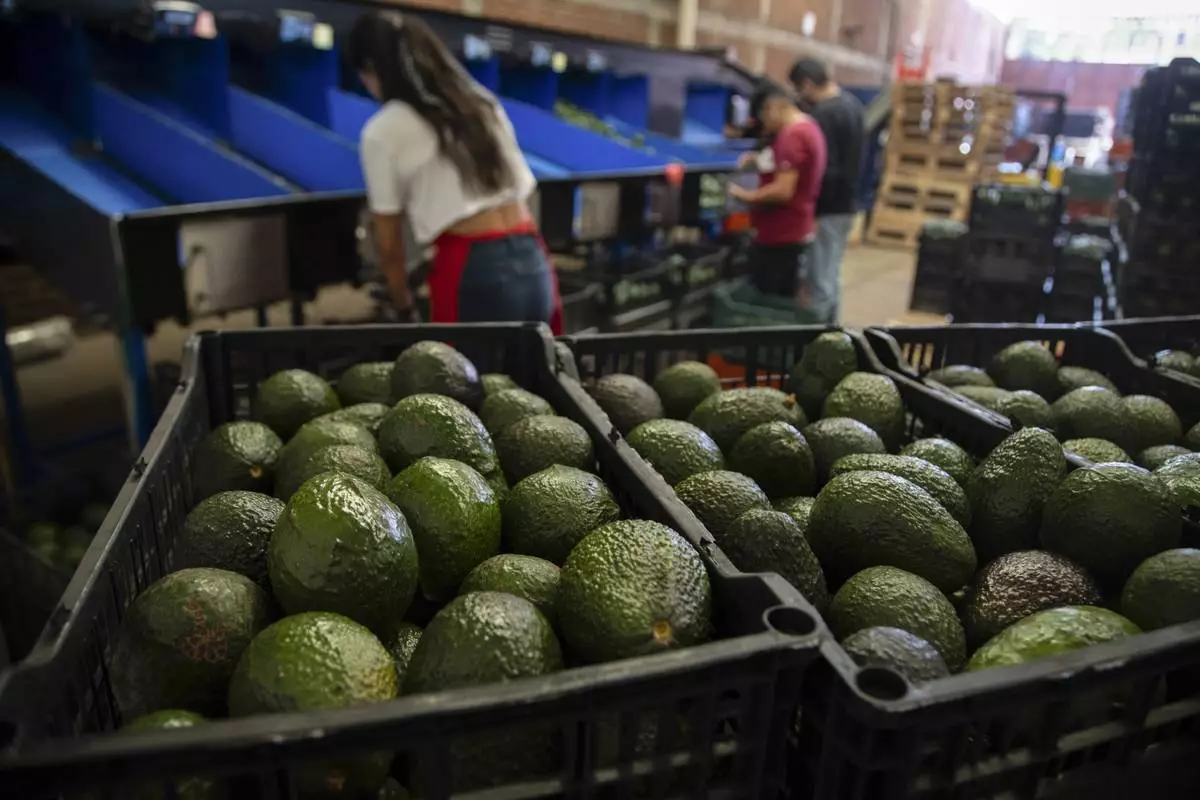
FILE - Avocados are stored in crates at a packing plant in Uruapan, Michoacan state, Mexico on Feb. 9, 2024. (AP Photo/Armando Solis, File)
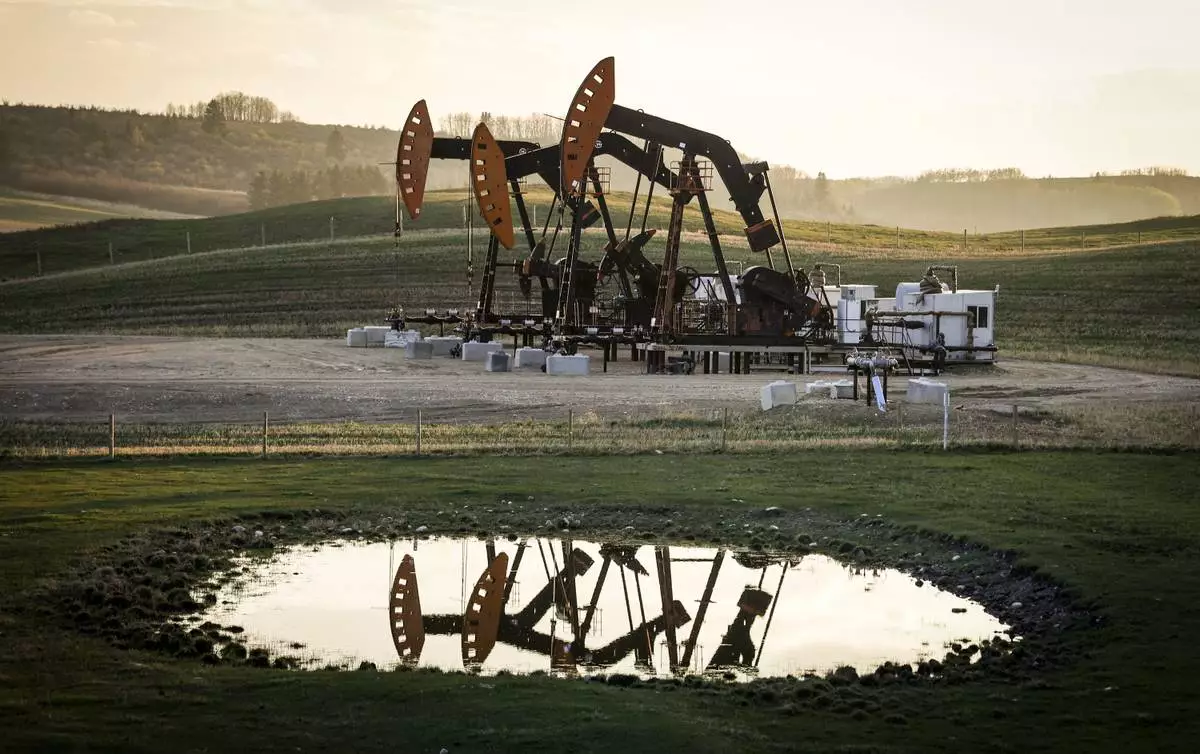
FILE - Pumpjacks draw out oil and gas from well heads as wildfire smoke hangs in the air near Calgary, Alberta, Sunday, May 12, 2024. (Jeff McIntosh/The Canadian Press via AP, File)
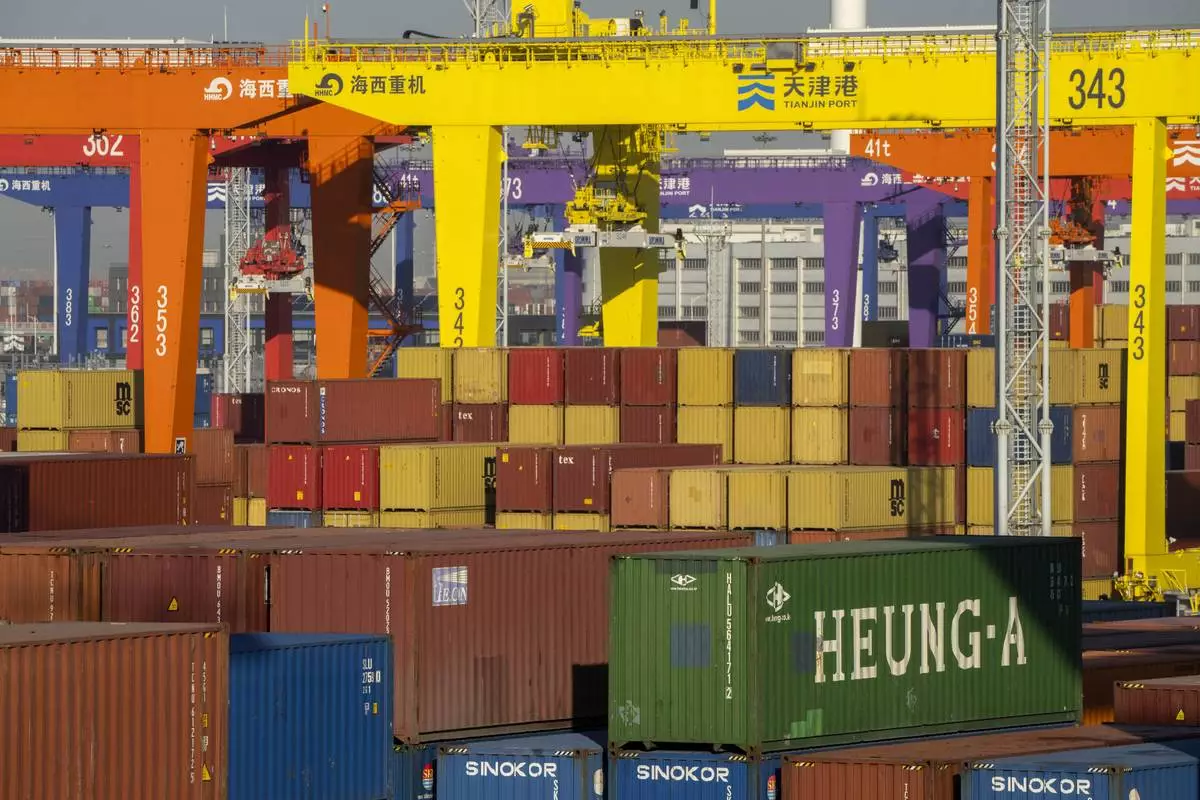
FILE - Shipping containers are stacked at a port in Tianjin, China, Jan. 16, 2023. (AP Photo/Mark Schiefelbein, File)

FILE - GM workers use human assistance automation to weld vehicle doors at the General Motors assembly plant during the COVID-19 pandemic in Oshawa, Ontario, March 19, 2021. (Nathan Denette/The Canadian Press via AP, File)

FILE - People buy groceries at a Walmart Superstore in Secaucus, New Jersey, July 11, 2024. (AP Photo/Eduardo Munoz Alvarez, File)
Israeli warplanes bombed the Lebanese capital of Beirut and its southern suburbs on Tuesday — a sign it was aiming to inflict punishment on the militant group Hezbollah in the final moments before any ceasefire takes hold. At least seven people were killed and 37 wounded in a crowded neighborhood near downtown, according to Lebanon’s Health Ministry.
Hezbollah, meanwhile, has resumed its rocket fire into Israel, triggering air raid sirens across the country's north.
Israeli Prime Minister Benjamin Netanyahu was meeting with his security Cabinet on Tuesday evening to discuss a proposed ceasefire, and he has scheduled a statement on national TV. Among the remaining issues is Israel's demand to reserve the right to take military action should Hezbollah violate its obligations under the emerging deal.
Hezbollah began attacking Israel on Oct. 8, 2023, a day after Hamas’ attack on southern Israel, in support of the Palestinian militant group. That has set off more than a year of fighting escalated into all-out war in September with massive Israeli airstrikes across Lebanon and an Israeli ground invasion of the country’s south. Hezbollah has fired thousands of rockets into Israeli military bases, cities and towns, including some 250 projectiles on Sunday.
It’s not clear how the ceasefire will affect the Israel-Hamas war in Gaza, where more than 44,000 people have been killed and more than 104,000 wounded in the 13-month war between Israel and Hamas, according to Gaza’s Health Ministry.
———
Here's the Latest:
BEIRUT — Lebanon’s state media said Israeli strikes on Tuesday killed at least 10 people in Baalbek province the country’s east.
At least three people were killed in the southern city of Tyre when Israel bombed a Palestinian refugee camp, said Mohammed Bikai, a representative of the Fatah group in the area. He said several more people were missing and at least three children were among the wounded.
He said the sites struck inside the camp were “completely civilian places” and included a kitchen that was being used to cook food for displaced people.
JERUSALEM — Dozens of Israeli protesters took to a major highway in Tel Aviv on Tuesday evening to call for the return of the hostages held by Hamas in Gaza, as the country awaited news of a potential ceasefire in Lebanon between Israel and Hezbollah.
Protesters chanted “We are all hostages,” and “Deal now!” waving signs with faces of some of the roughly 100 hostages believed to be still held in Gaza, at least a third of whom are thought to be dead. Most of the other hostages Hamas captured in the Oct. 7, 2023 attack were released during a ceasefire last year.
The prospect of a ceasefire deal in Lebanon has raised desperation among the relatives of captives still held in Gaza, who once hoped that the release of hostages from Gaza would be included. Instead of a comprehensive deal, the ceasefire on the table is instead narrowly confined to Lebanon.
Dozens of Israelis were also demonstrating against the expected cease-fire, gathering outside Israel’s military headquarters in central Tel Aviv.
One of the protesters, Yair Ansbacher, says the deal is merely a return to the failed 2006 U.N. resolution that was meant to uproot Hezbollah from the area. “Of course that didn’t happen,” he says. “This agreement is not worth the paper it is written on.”
FIUGGI, Italy — Foreign ministers from the world’s industrialized countries said Tuesday they strongly supported an immediate ceasefire between Israel and Hezbollah and insisted that Israel comply with international law in its ongoing military operations in the region.
At the end of their two-day summit, the ministers didn’t refer directly to the International Criminal Court and its recent arrest warrants for Israeli Prime Minister Benjamin Netanyahu and his former defense minister over crimes against humanity.
Italy had put the ICC warrants on the official meeting agenda, even though the G7 was split on the issue. The U.S., Israel’s closest ally, isn’t a signatory to the court and has called the warrants “outrageous.” However, the EU’s chief diplomat Josep Borrell said all the other G7 countries were signatories and therefore obliged to respect the warrants.
In the end, the final statement adopted by the ministers said Israel, in exercising its right to defend itself, “must fully comply with its obligations under international law in all circumstances, including international humanitarian law.”
And it said all G7 members — Canada, France, Germany, Italy, Japan, the United Kingdom and the United States – “reiterate our commitment to international humanitarian law and will comply with our respective obligations.” It stressed that “there can be no equivalence between the terrorist group Hamas and the State of Israel.”
The ICC warrants say there's reason to believe Netanyahu used “starvation as a method of warfare” by restricting humanitarian aid and intentionally targeted civilians in Israel’s campaign against Hamas in Gaza — charges Israeli officials deny.
BEIRUT — An Israeli strike on Tuesday levelled a residential building in the central Beirut district of Basta — the second time in recent days warplanes have hit the crowded area near the city’s downtown. At least seven people were killed and 37 wounded in Beirut, according to Lebanon’s Health Ministry.
It was not immediately clear if anyone in particular was targeted, though Israel says its airstrikes target Hezbollah officials and assets.
The Israeli military spokesman issued a flurry of evacuation warnings for many areas, including areas in Beirut that have not been targeted throughout the war, like the capital’s commercial Hamra district, where many people displaced by the war have been staying.
The warnings, coupled with fear that Israel was ratcheting up attacks in Lebanon during the final hours before a ceasefire is reached, sparked panic and sent residents fleeing in their cars to safer areas.
In areas close to Hamra, families including women and children were seen running away toward the Mediterranean Sea’s beaches carrying their belongings. Traffic was completely gridlocked as people tried to get away, honking their car horns as Israeli drones buzzed loudly overhead.
The Israeli military also issued warnings for 20 more buildings in Beirut’s suburbs to evacuate before they too were struck — a sign it was aiming to inflict punishment on Hezbollah in the final moments before any ceasefire takes hold.
TEL AVIV, Israel — The independent civilian commission of inquiry into the October 2023 Hamas attack on Israel has found Prime Minister Benjamin Netanyahu directly responsible for the failures leading up to the attack, alongside former defense ministers, the army chief and the heads of the security services.
The civil commission presented its findings today after a four-month probe in which it heard some 120 witnesses. It was set up by relatives of victims of the Hamas attack, in response to the absence of any state probe.
The commission determined that the Israeli government, its army and security services “failed in their primary mission of protecting the citizens of Israel.” It said Netanyahu was responsible for ignoring “repeated warnings” ahead of Oct. 7, 2023 for what it described as his appeasing approach over the years toward Hamas, and for “undermining all decision-making centers, including the cabinet and the National Security Council, in a way that prevented any serious discussion” on security issues.
The commission further determined that the military and defense leaders bear blame for ignoring warnings from within the army, and for reducing the army’s presence along the Gaza border while relying excessively on technological means. On the day of the Hamas attack, the report says, the army’s response was both slow and lacking.
The civil commission called for the immediate establishment of a state commission of inquiry into the Oct. 7 attack.
Netanyahu has opposed launching a state commission of inquiry, arguing that such an investigation should begin only once the war is over.
JERUSALEM -- The Israeli military says its ground troops have reached parts of Lebanon’s Litani River — a focal point of the emerging ceasefire.
In a statement Tuesday, the army said it had reached the Wadi Slouqi area in southern Lebanon and clashed with Hezbollah forces.
Under a proposed ceasefire, Hezbollah would be required to move its forces north of the Litani, which in some places is some 30 kilometers (20 miles) north of the Israeli border.
The military says the clashes with Hezbollah took place on the eastern end of the Litani, just a few kilometers (miles) from the border. It is one of the deepest places Israeli forces have reached in a nearly two-month ground operation.
The military says soldiers destroyed rocket launchers and missiles and engaged in “close-quarters combat” with Hezbollah forces.
The announcement came hours before Israel’s security Cabinet is expected to approve a ceasefire that would end nearly 14 months of fighting.
BEIRUT — Israeli jets Tuesday struck at least six buildings in Beirut’s southern suburbs Tuesday, including one that slammed near the country’s only airport.
Large plumes of smoke could be seen around the airport near the Mediterranean coast, which has continued to function despite its location beside the densely populated suburbs where many of Hezbollah’s operations are based.
The strikes come hours before Israel’s cabinet was scheduled to meet to discuss a proposal to end the fighting between Israel and Hezbollah. The proposal calls for an initial two-month ceasefire during which Israeli forces would withdraw from Lebanon and Hezbollah would end its armed presence along the southern border south of the Litani River.
There were no immediate reports of casualties from Tuesday’s airstrikes.
FIUGGI, Italy — EU top diplomat Josep Borrell, whose term ends Dec. 1, said he proposed to the G7 and Arab ministers who joined in talks on Monday that the U.N. Security Council take up a resolution specifically demanding humanitarian assistance reach Palestinians in Gaza, saying deliveries have been completely impeded.
“The two-state solution will come later. Everything will come later. But we are talking about weeks or days,” for desperate Palestinians, he said. “Hunger has been used as an arm against people who are completely abandoned.”
It was a reference to the main accusation levelled by the International Criminal Court in its arrest warrants against Israeli Prime Minister Benjamin Netanyahu and his former defense minister.
Borrell said the signatories to the court, including six of the seven G7 members, are obliged under international law to respect and implement the court’s decisions.
Host Italy put the ICC warrants on the G7 agenda at the last minute, but there was no consensus on the wording of how the G7 would respond given the U.S., Israel’s closest ally, has called the warrants “outrageous.”
Italy, too, has said it respects the court but expressed concern that the warrants were politically motivated and ill-advised given Netanyahu is necessary for any deal to end the conflicts in Gaza and Lebanon.
“Like it or not, the International Criminal Court is a court as powerful as any national court,” Borrell said. “And if the Europeans don’t support International Criminal Court then there would not be any hope for justice,” he said.
Borrell, whose term ends Dec. 1, said he proposed to the G7 and Arab ministers who joined in talks on Monday that the U.N. Security Council take up a resolution specifically demanding humanitarian assistance reach Palestinians in Gaza, saying deliveries have been completely impeded.
“The two-state solution will come later. Everything will come later. But we are talking about weeks or days,” for desperate Palestinians, he said. “Hunger has been used as an arm against people who are completely abandoned.”
It was a reference to the main accusation levelled by the International Criminal Court in its arrest warrants against Israeli Prime Minister Benjamin Netanyahu and his former defense minister.
Borrell said the signatories to the court, including six of the seven G7 members, are obliged under international law to respect and implement the court’s decisions.
Host Italy put the ICC warrants on the G7 agenda at the last minute, but there was no consensus on the wording of how the G7 would respond given the U.S., Israel’s closest ally, has called the warrants “outrageous.”
Italy, too, has said it respects the court but expressed concern that the warrants were politically motivated and ill-advised given Netanyahu is necessary for any deal to end the conflicts in Gaza and Lebanon.
“Like it or not, the International Criminal Court is a court as powerful as any national court,” Borrell said. “And if the Europeans don’t support International Criminal Court then there would not be any hope for justice,” he said. (edited)
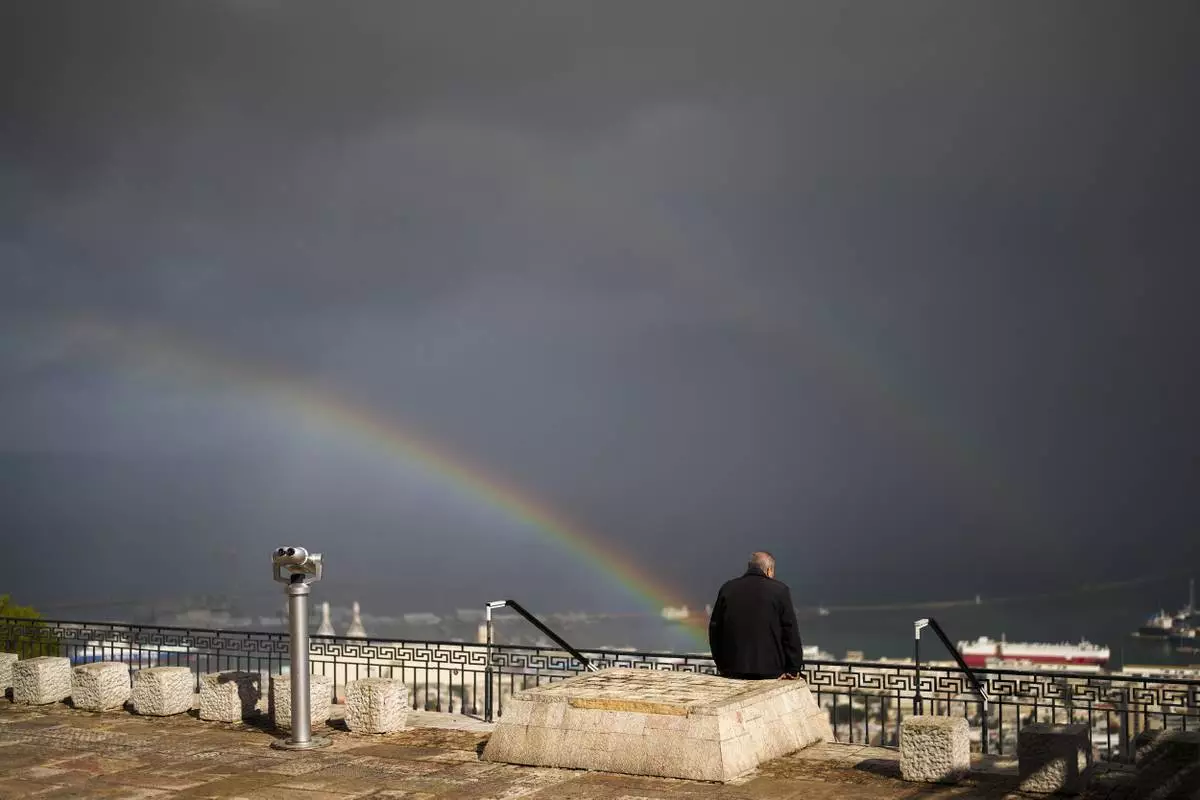
A double rainbow stretches across the sky as a man sits at a promenade overlooking Haifa, Israel, Tuesday, Nov. 26, 2024. (AP Photo/Francisco Seco)
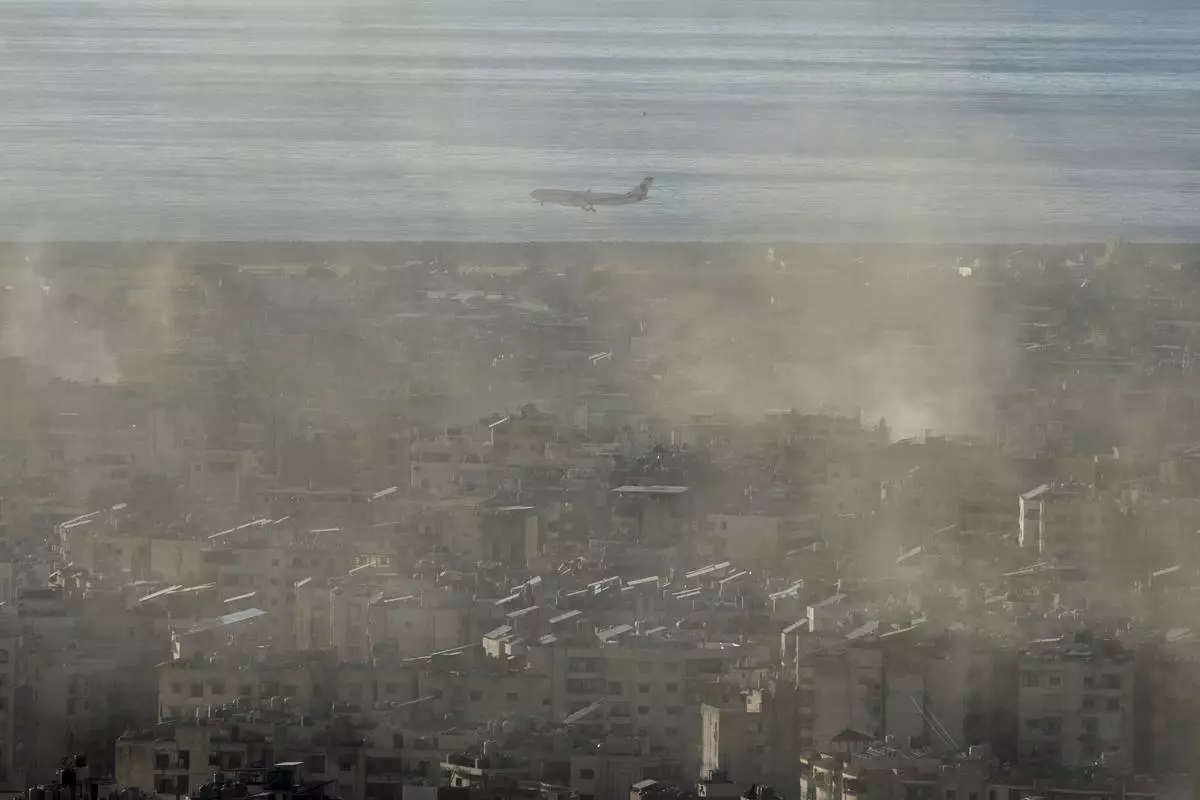
A Middle East Airlines airplane flies over Dahiyeh as smoke rises from Israeli airstrikes in Dahiyeh, Beirut, Lebanon, Tuesday, Nov. 26, 2024. (AP Photo/Bilal Hussein)
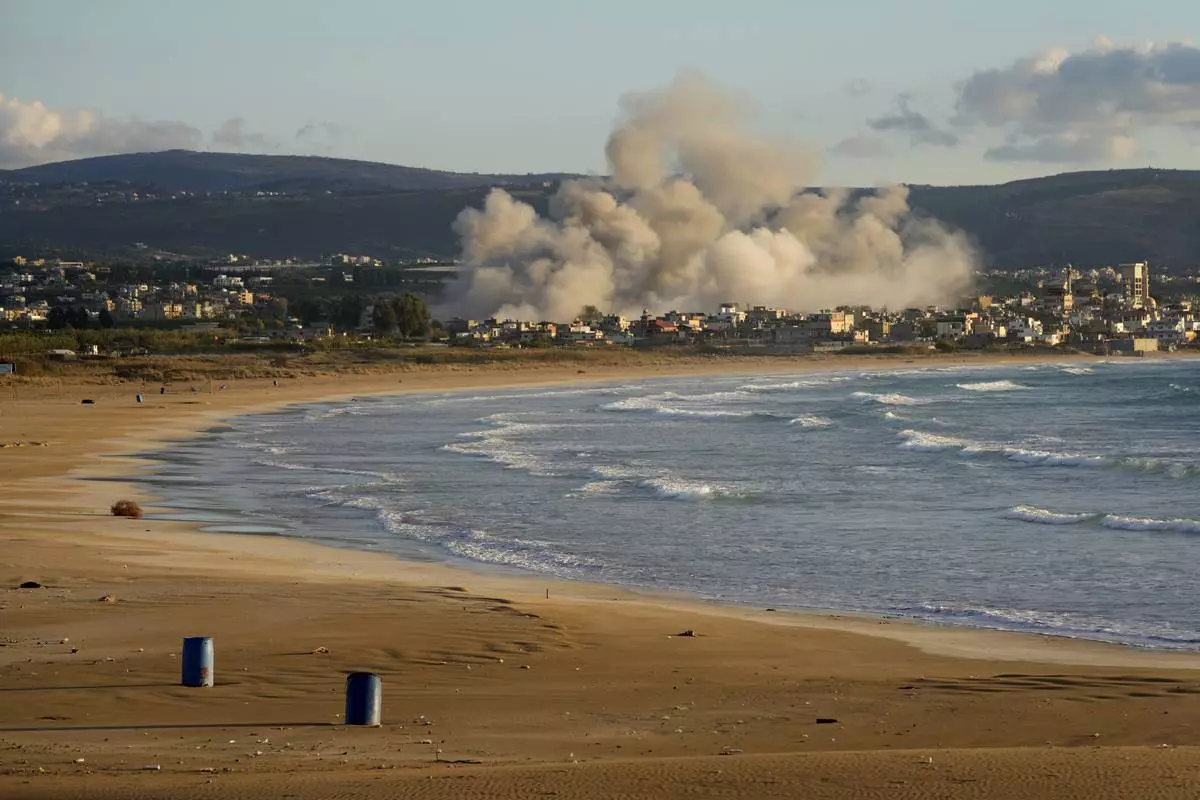
Smoke rises between buildings hit in Israeli airstrikes near the Palestinian refugee camp of Rashidiyeh, as seen from Tyre city, south Lebanon, Tuesday, Nov. 26, 2024. (AP Photo/Hussein Malla)
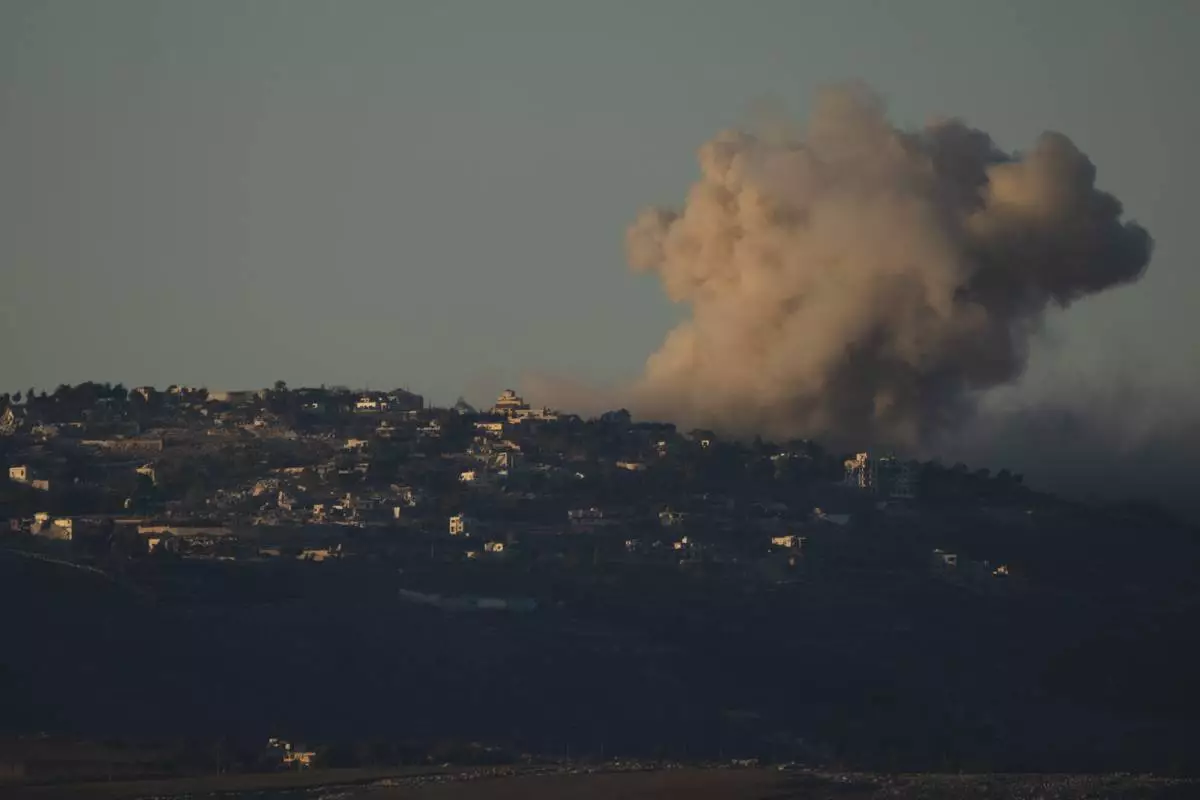
Smoke rises following Israeli bombardment in southern Lebanon as seen from northern Israel, Tuesday, Nov. 26, 2024. (AP Photo/Leo Correa)
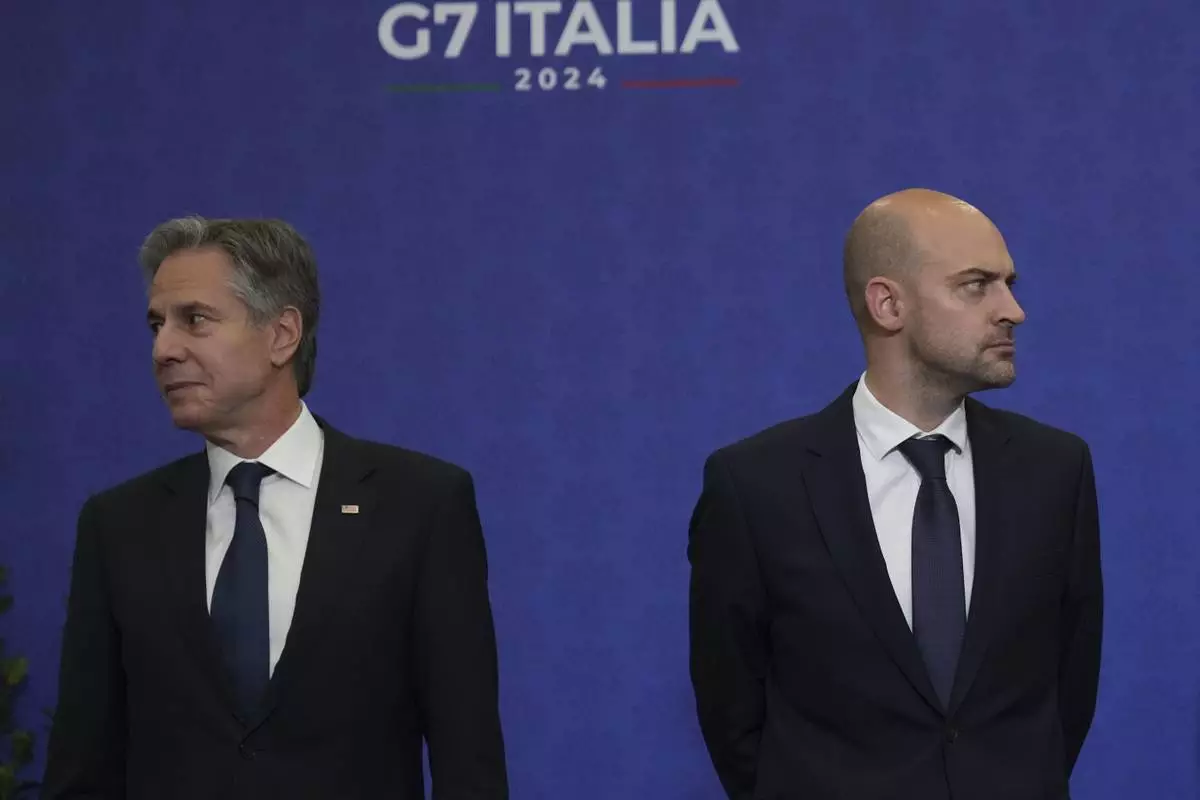
U.S. Secretary of State Antony Blinken, left, and foreign Ministers of France, Jean-Noël Barrot, wait for the family photo at the G7 of foreign Ministers in Fiuggi, some 70 kilometers south-east of Rome, Tuesday, Nov. 26, 2024. (AP Photo/Alessandra Tarantino, Pool)
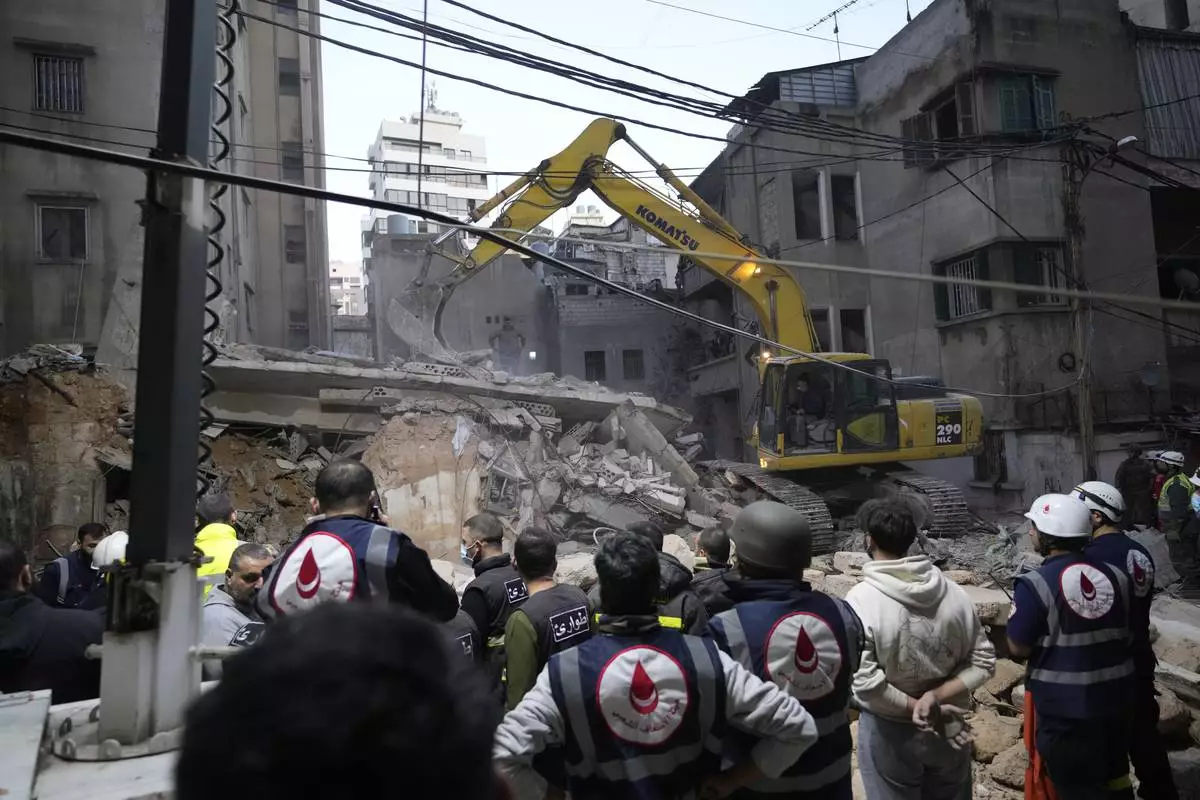
Rescuers use an excavator as they search for victims at the site of an Israeli airstrike that targeted a building in Beirut, Lebanon, Tuesday, Nov. 26, 2024. (AP Photo/Hassan Ammar)
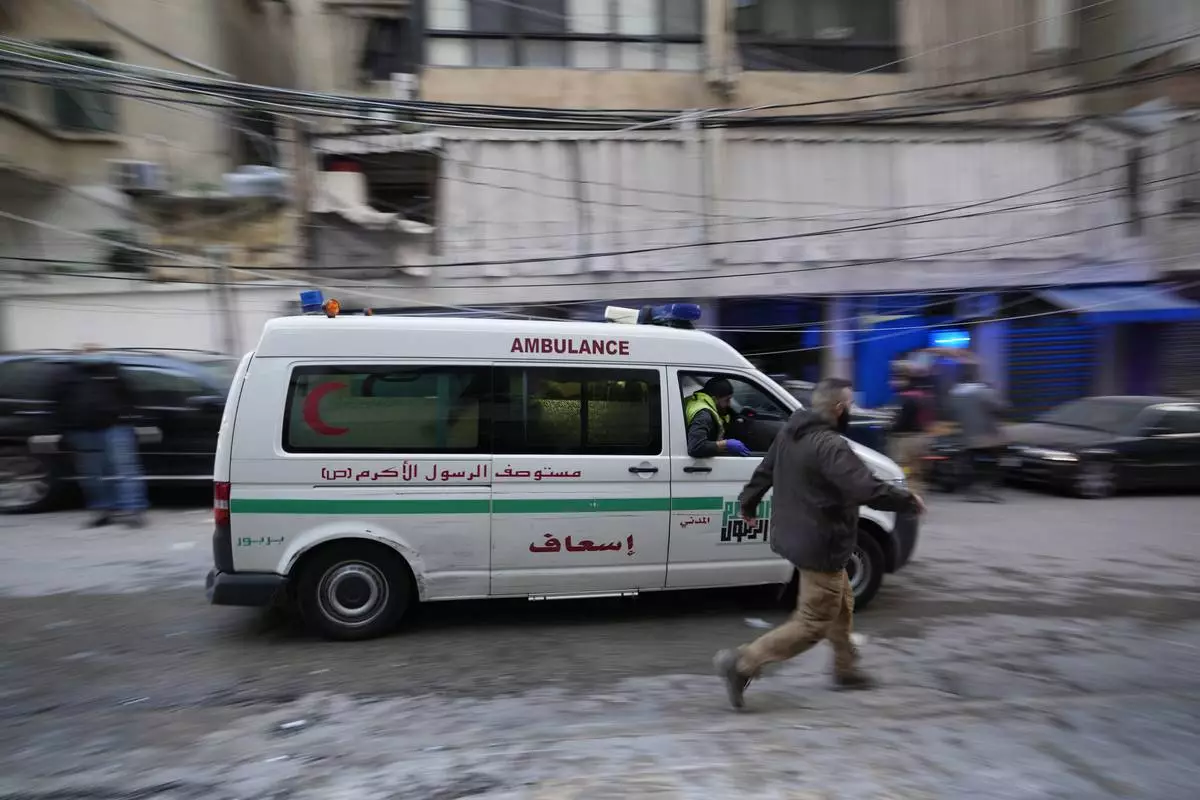
A man runs next to an ambulance arriving at the site of an Israeli airstrike that targeted a building in Beirut, Lebanon, Tuesday, Nov. 26, 2024. (AP Photo/Hassan Ammar)
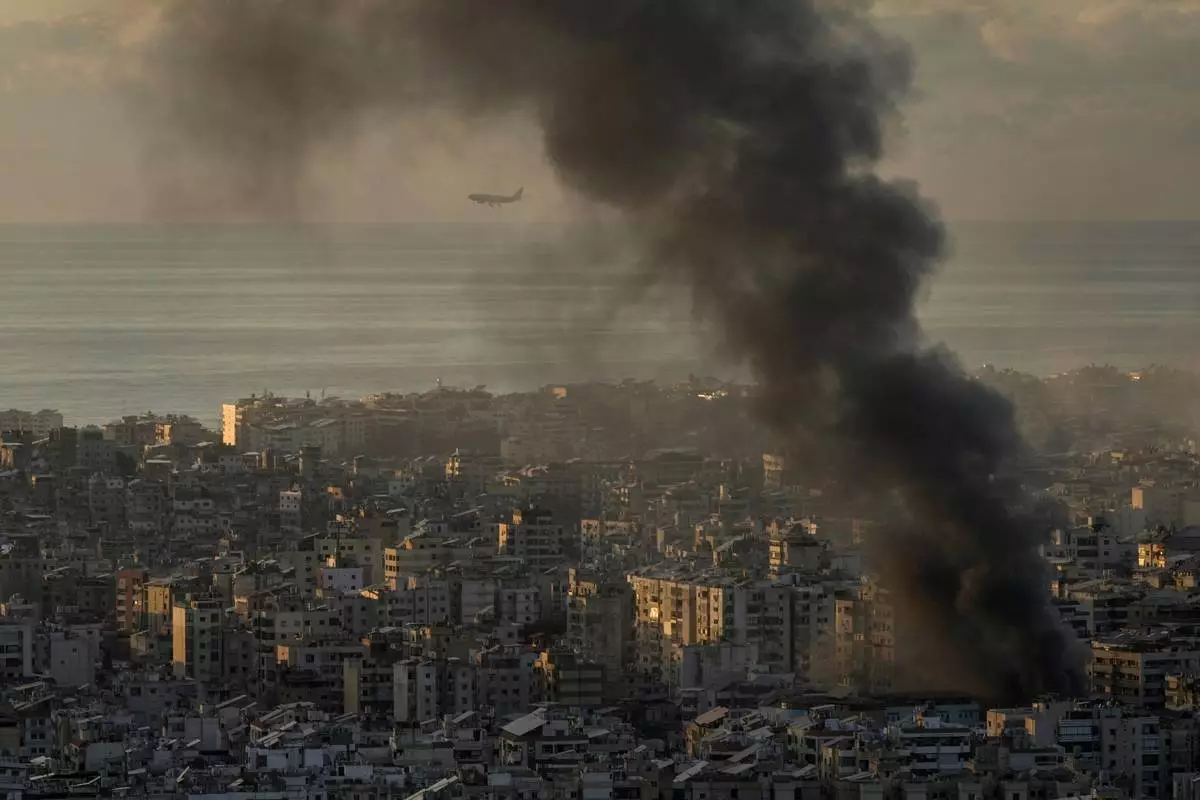
A Middle East Airlines plane flies as smoke rises following an Israeli airstrike on Dahiyeh, in Beirut, Lebanon, Tuesday, Nov. 26, 2024. (AP Photo/Bilal Hussein)
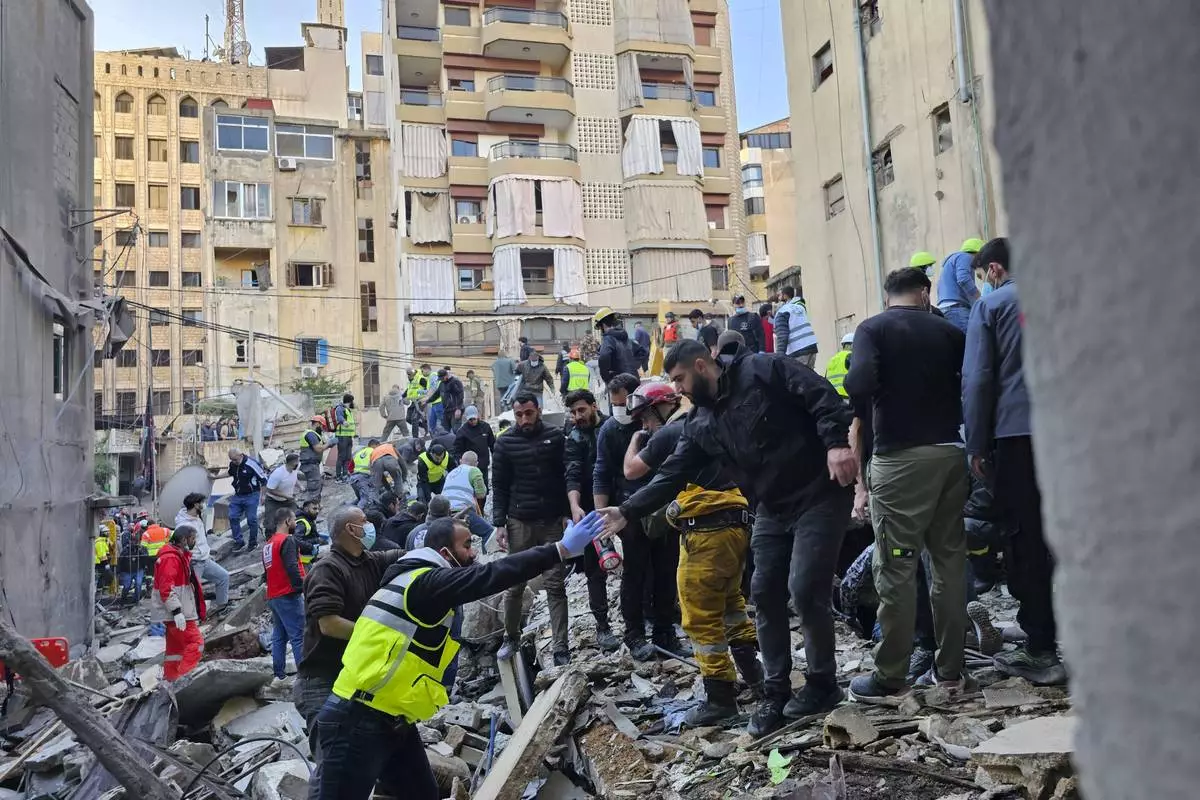
Rescuers search for victims at the site of an Israeli airstrike that targeted a building in Beirut, Lebanon, Tuesday, Nov. 26, 2024. (AP Photo/Hassan Ammar)
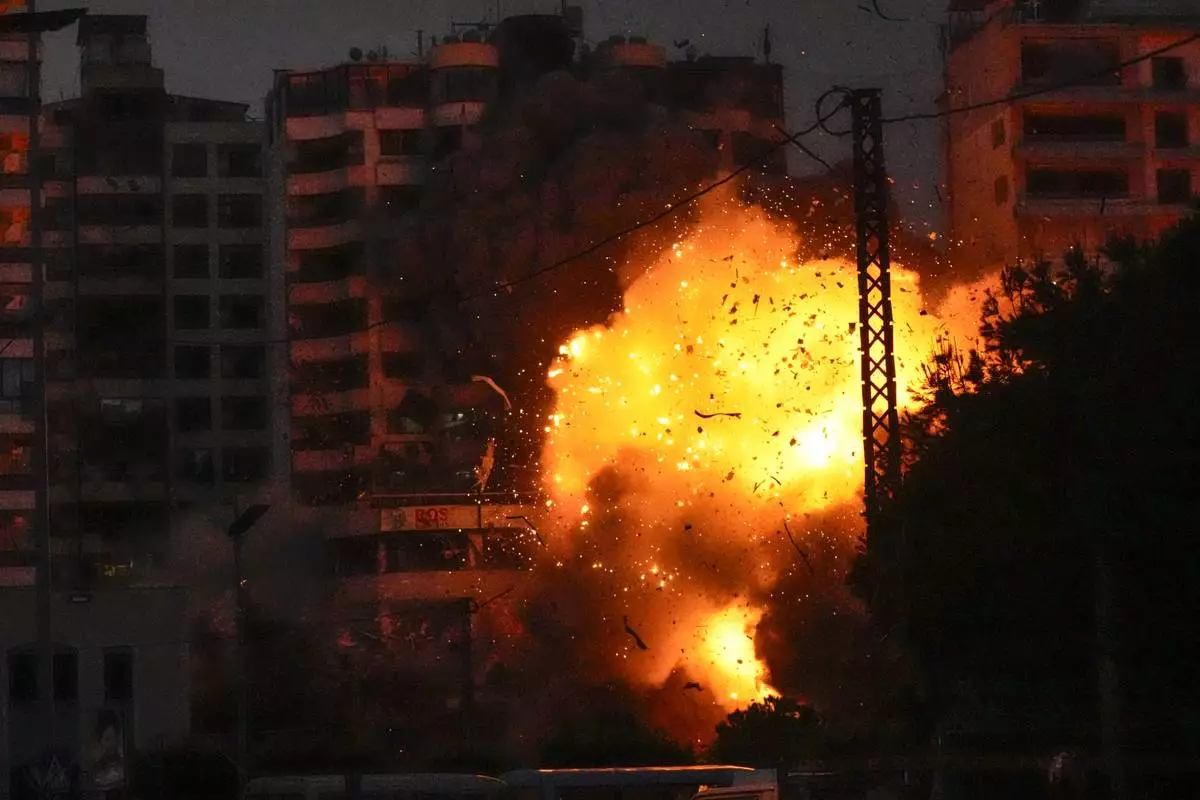
Thick smoke, flames and debris erupt from an Israeli airstrike that targeted a building in Tayouneh, Beirut, Lebanon, Monday, Nov. 25, 2024. (AP Photo/Hassan Ammar)
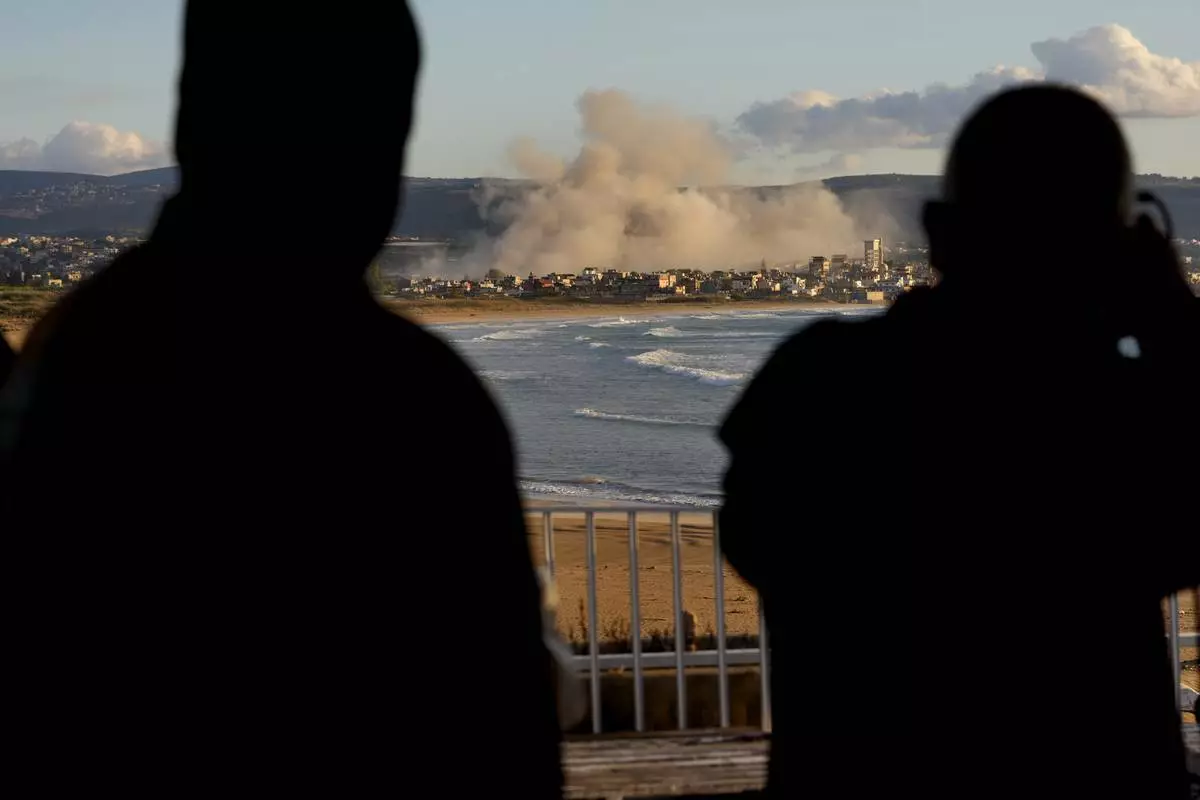
Journalists watch the smoke rising between buildings hit in Israeli airstrikes near the Palestinian refugee camp of Rashidiyeh, as it seen from Tyre city, south Lebanon, Tuesday, Nov. 26, 2024. (AP Photo/Hussein Malla)
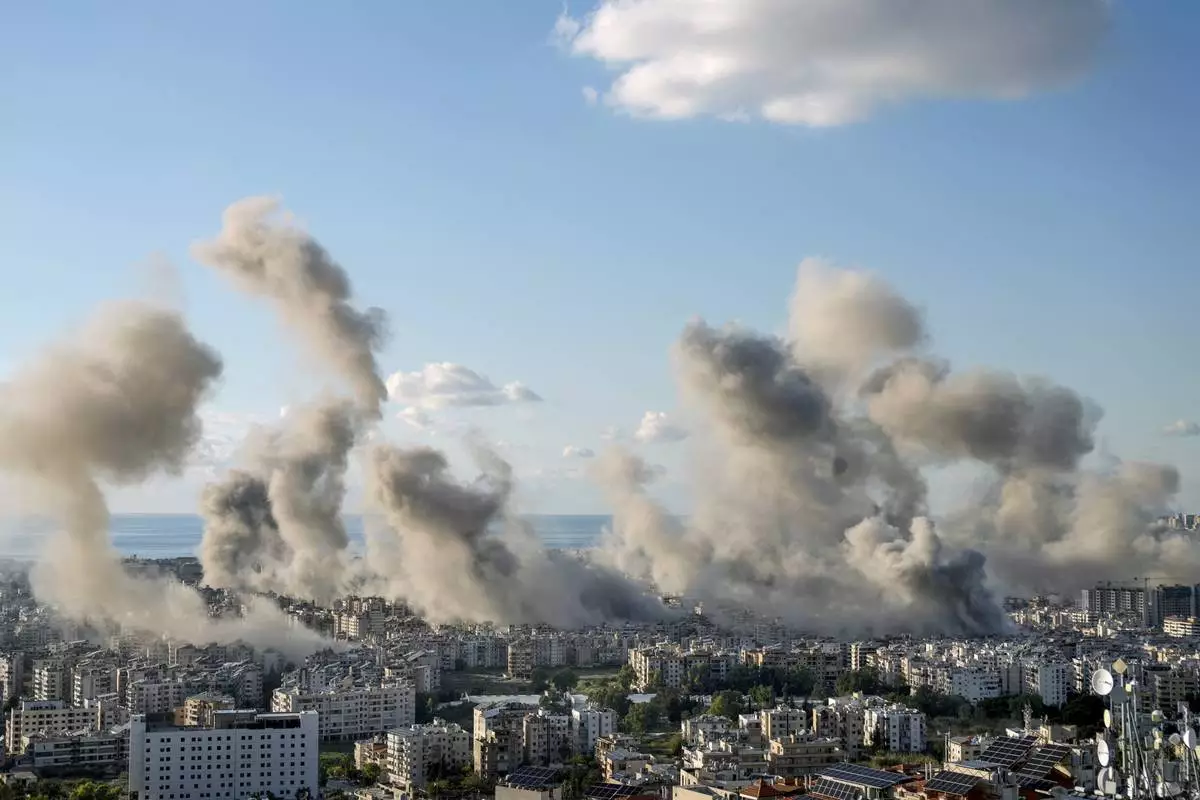
Smoke rises following an Israeli airstrike on Dahiyeh, in Beirut, Lebanon, Tuesday, Nov. 26, 2024. (AP Photo/Bilal Hussein)
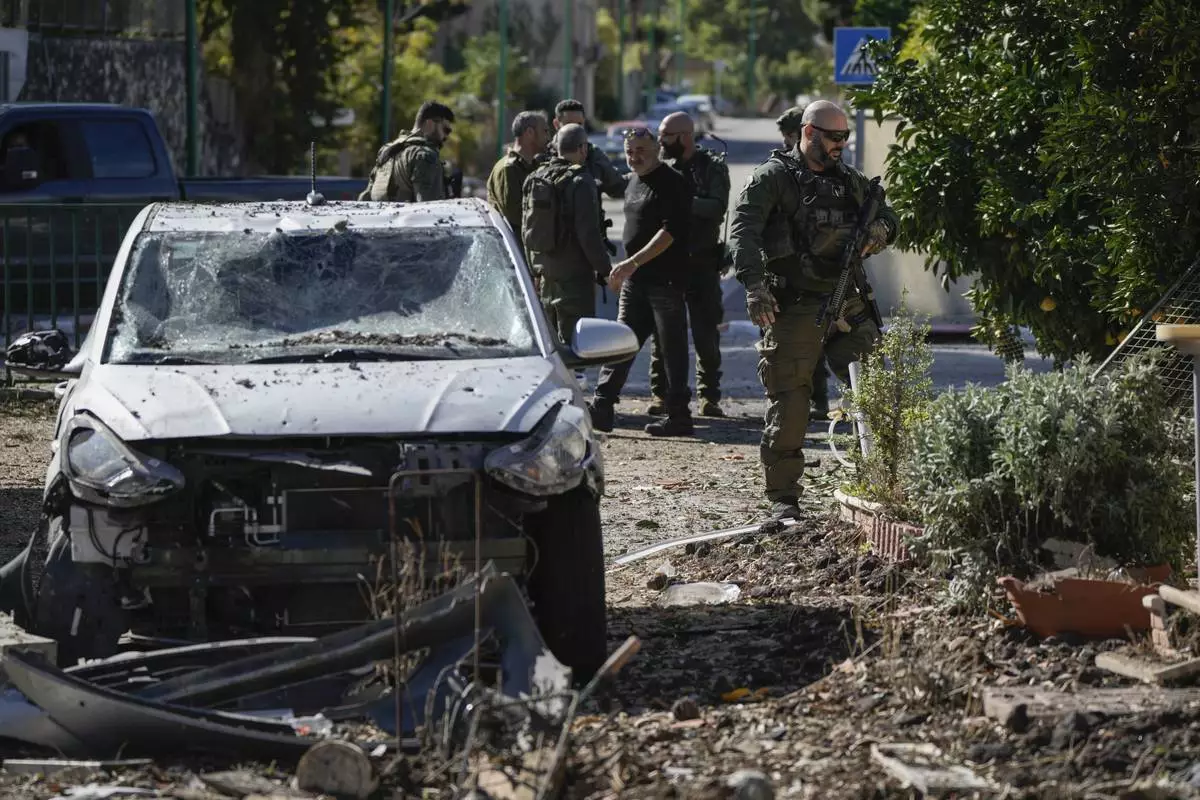
Israeli security officers and army soldiers inspect the site where a rocket fired from Lebanon landed in a backyard in Kiryat Shmona, northern Israel, Tuesday Nov. 26, 2024. (AP Photo/Leo Correa)
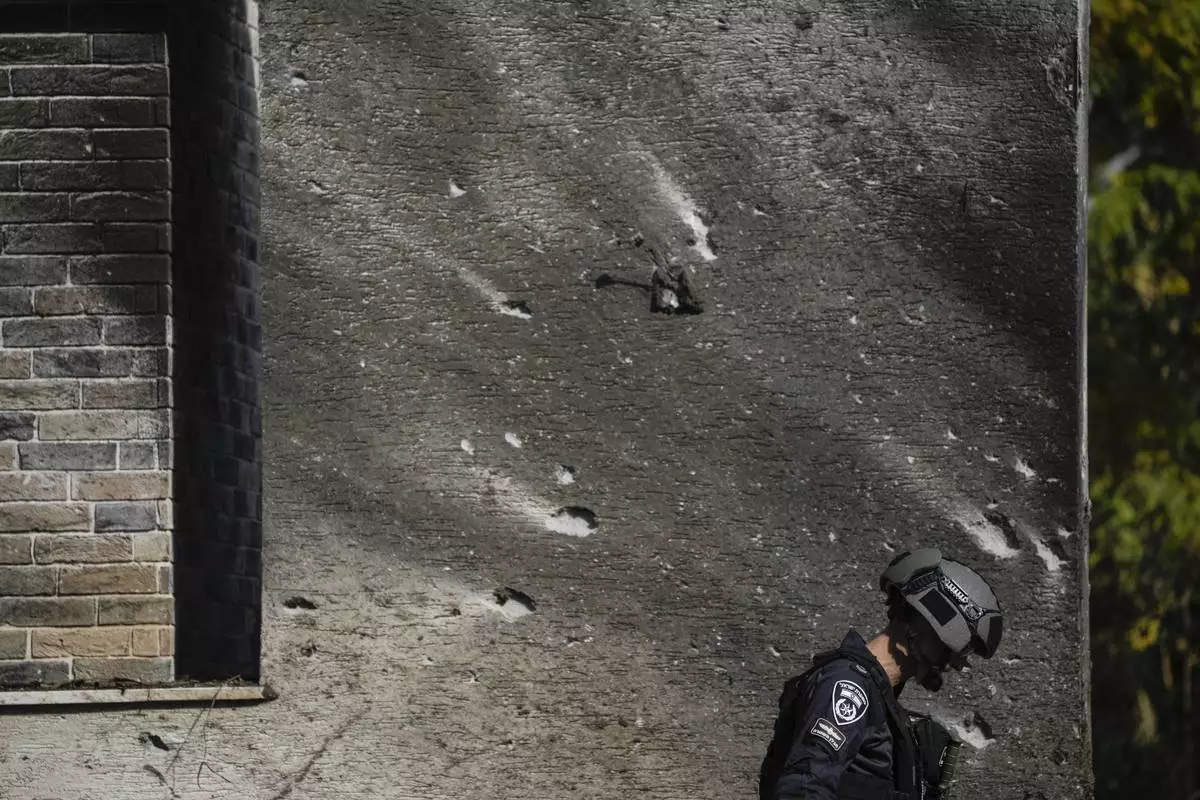
A police bomb squad officer inspects the site where a rocket fired from Lebanon landed in a backyard in Kiryat Shmona, northern Israel, Tuesday Nov. 26, 2024. (AP Photo/Leo Correa)
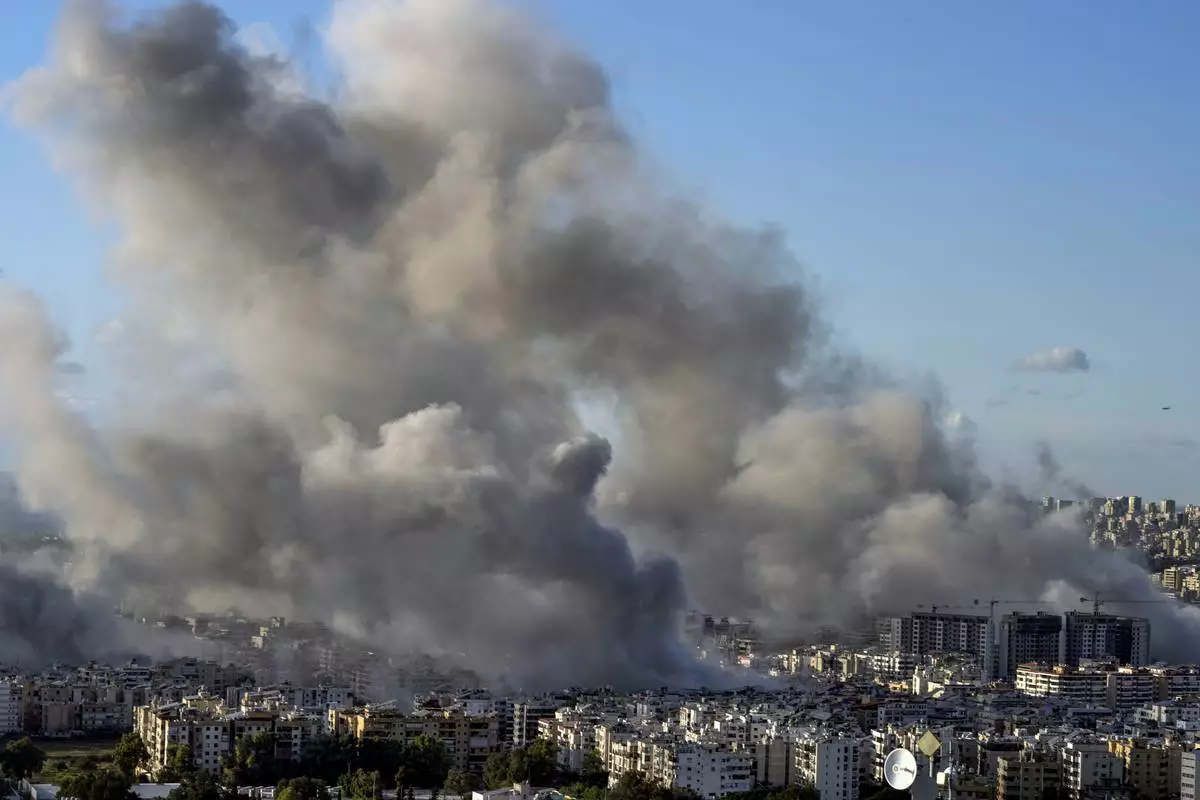
Smoke rises following an Israeli airstrike on Dahiyeh, in Beirut, Lebanon, Tuesday, Nov. 26, 2024. (AP Photo/Bilal Hussein)
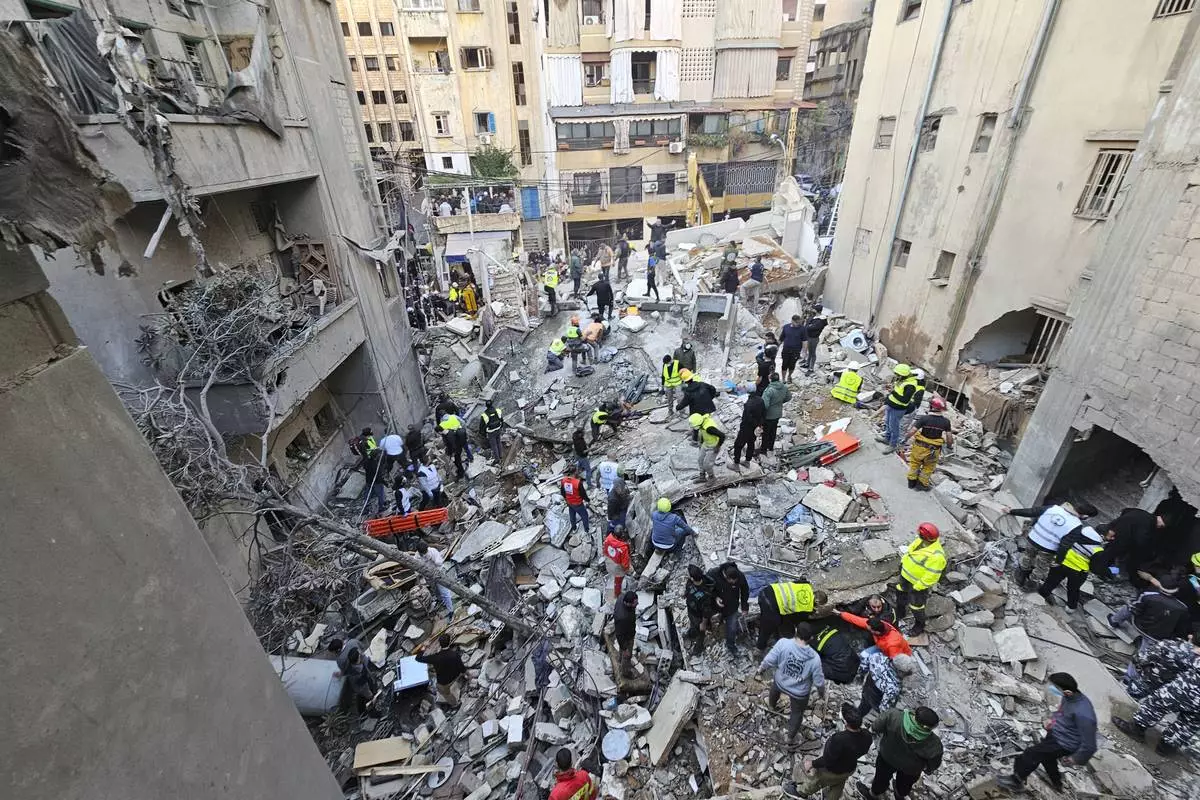
Rescuers search for victims at the site of an Israeli airstrike that targeted a building in Beirut, Lebanon, Tuesday, Nov. 26, 2024. (AP Photo/Hassan Ammar)
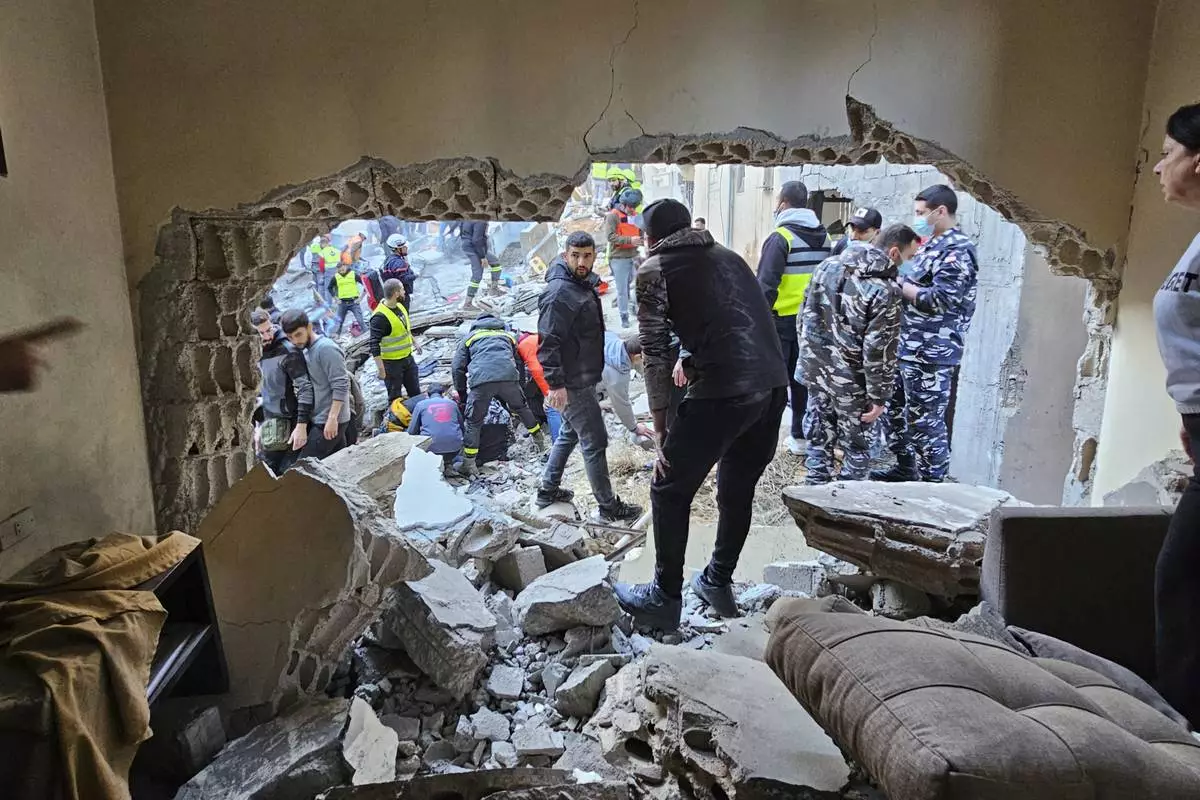
Rescuers and residents search for victims at the site of an Israeli airstrike that targeted a building in Beirut, Lebanon, Tuesday, Nov. 26, 2024. (AP Photo/Hassan Ammar)
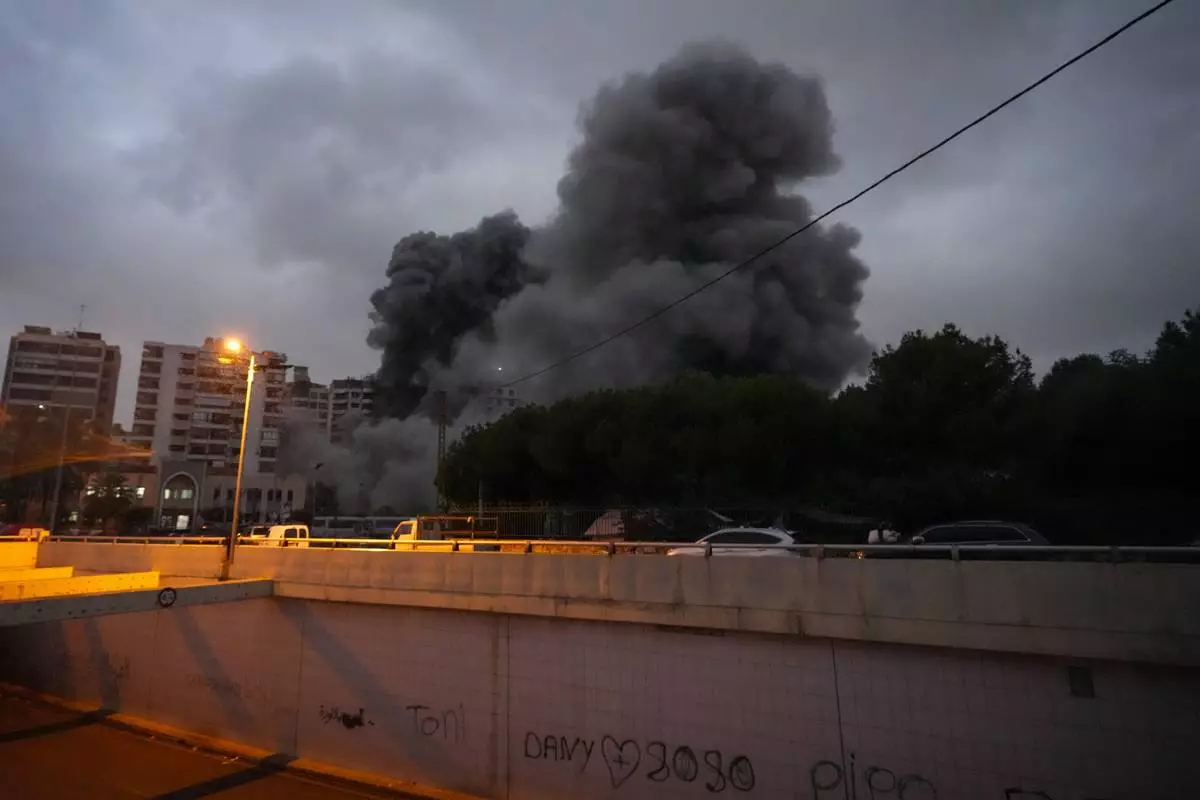
Smoke rise from an Israeli airstrike in Tayouneh, Beirut, Lebanon, Monday, Nov. 25, 2024. (AP Photo/Hassan Ammar)
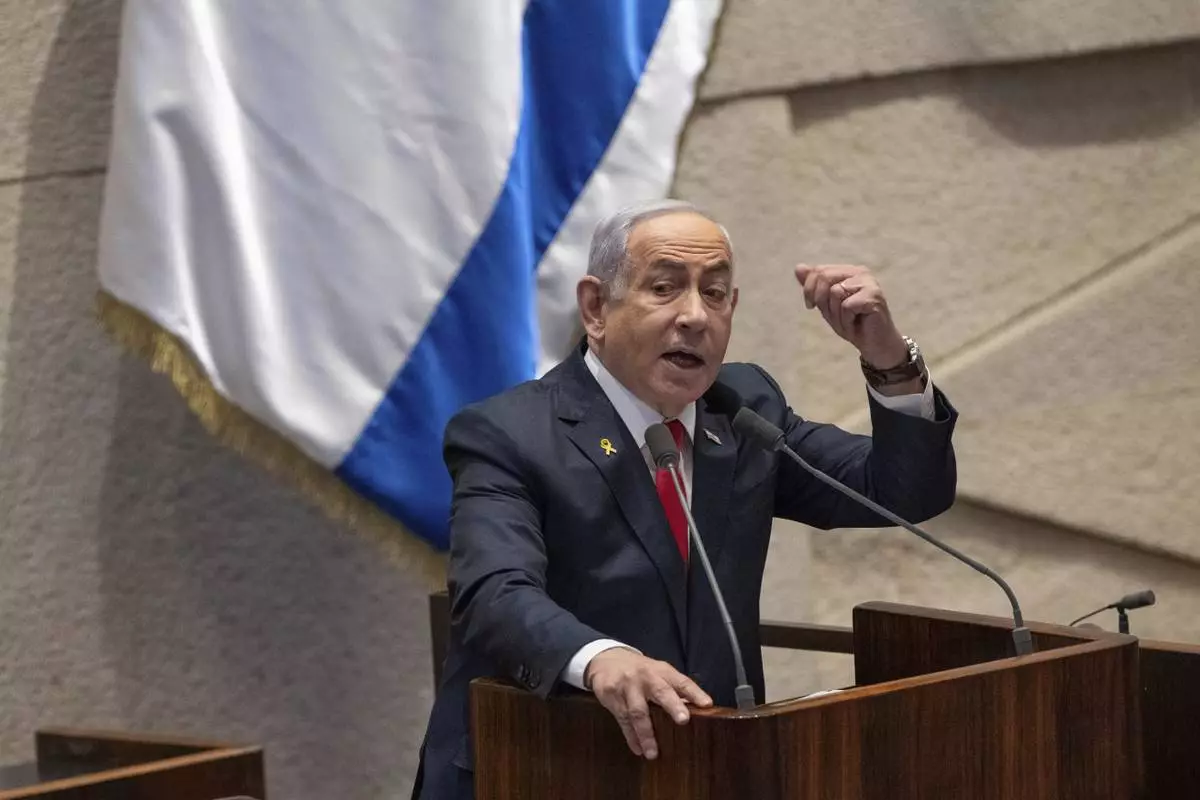
Israel's Prime Minister Benjamin Netanyahu addresses lawmakers in the Knesset, Israel's parliament, in Jerusalem. Monday Nov. 18, 2024. (AP Photo/Ohad Zwigenberg)
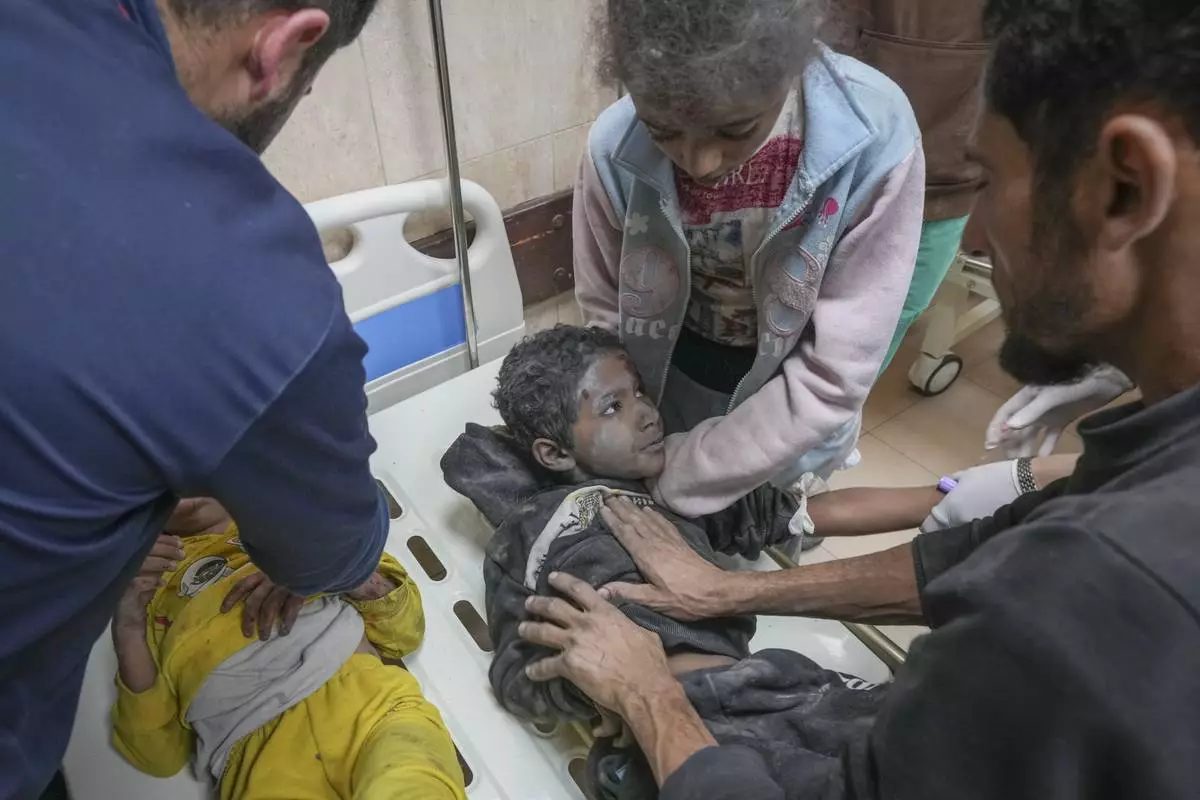
Injured children during an overnight Israeli army strike are assisted upon their arrival at the hospital in Deir al-Balah, Gaza Strip, Sunday Nov. 24, 2024. (AP Photo/Abdel Kareem Hana)

A girl injured during an overnight Israeli army strike is assisted upon her arrival at the hospital in Deir al-Balah, Gaza Strip, Sunday Nov. 24, 2024. (AP Photo/Abdel Kareem Hana)
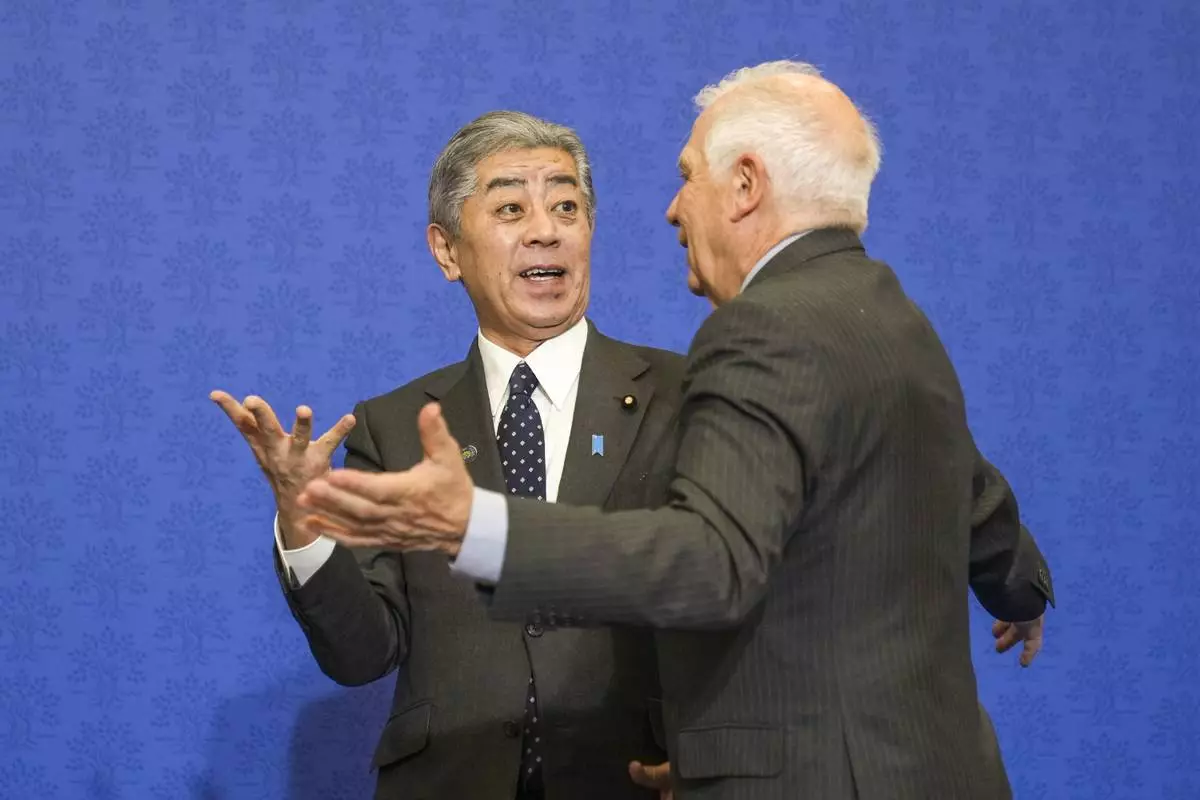
Japanese Foreign Minister Takeshi Iwaya, left, talks to European Union foreign policy chief Josep Borrell after a family photo at the G7 of foreign Ministers in Fiuggi, some 70 kilometers south-east of Rome, Tuesday, Nov. 26, 2024. (AP Photo/Alessandra Tarantino, Pool)
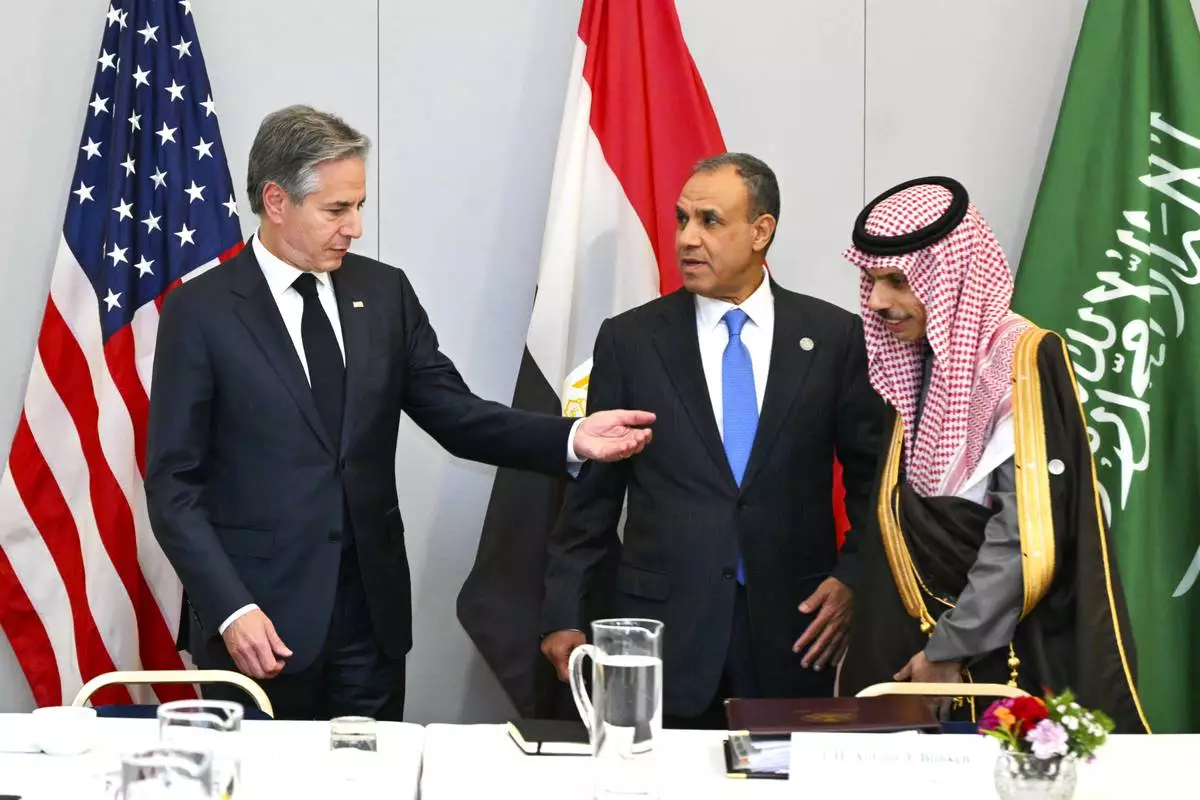
From left : US Secretary of State Antony Blinken, Egypt's Foreign Minister Badr Abdelatty and Foreign Minister of Saudi Arabia Faisal bin Farhan Al-Saud attend a working session at the G7 Foreign Ministers meeting in Fiuggi, Italy, Monday, Nov. 25, 2024. (Andreas Solaro/Pool Photo via AP)
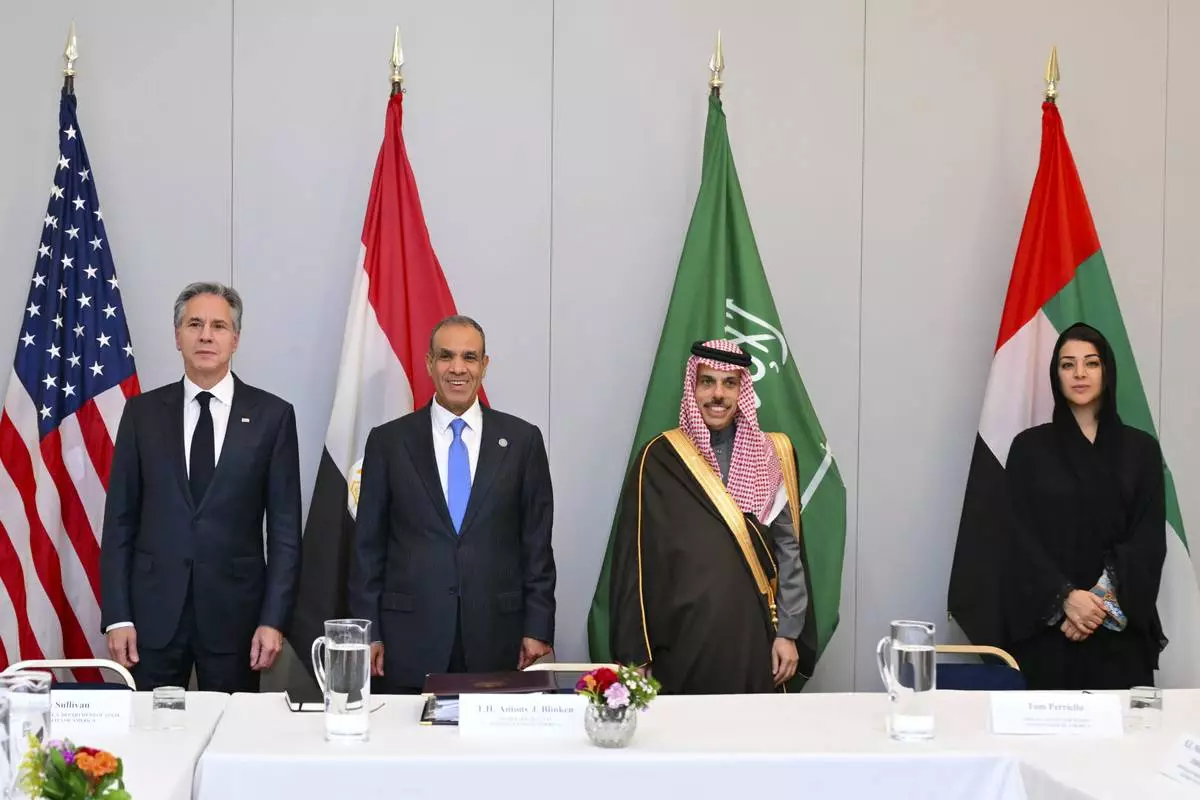
From left : US Secretary of State Antony Blinken, Egypt's Foreign Minister Badr Abdelatty, Foreign Minister of Saudi Arabia Faisal bin Farhan Al-Saud and UAE Minister of State for International Cooperation Reem al-Hashimy pose for a picture during a working session at the G7 Foreign Ministers meeting in Fiuggi, Italy, Monday, Nov. 25, 2024. (Andreas Solaro/Pool Photo via AP)
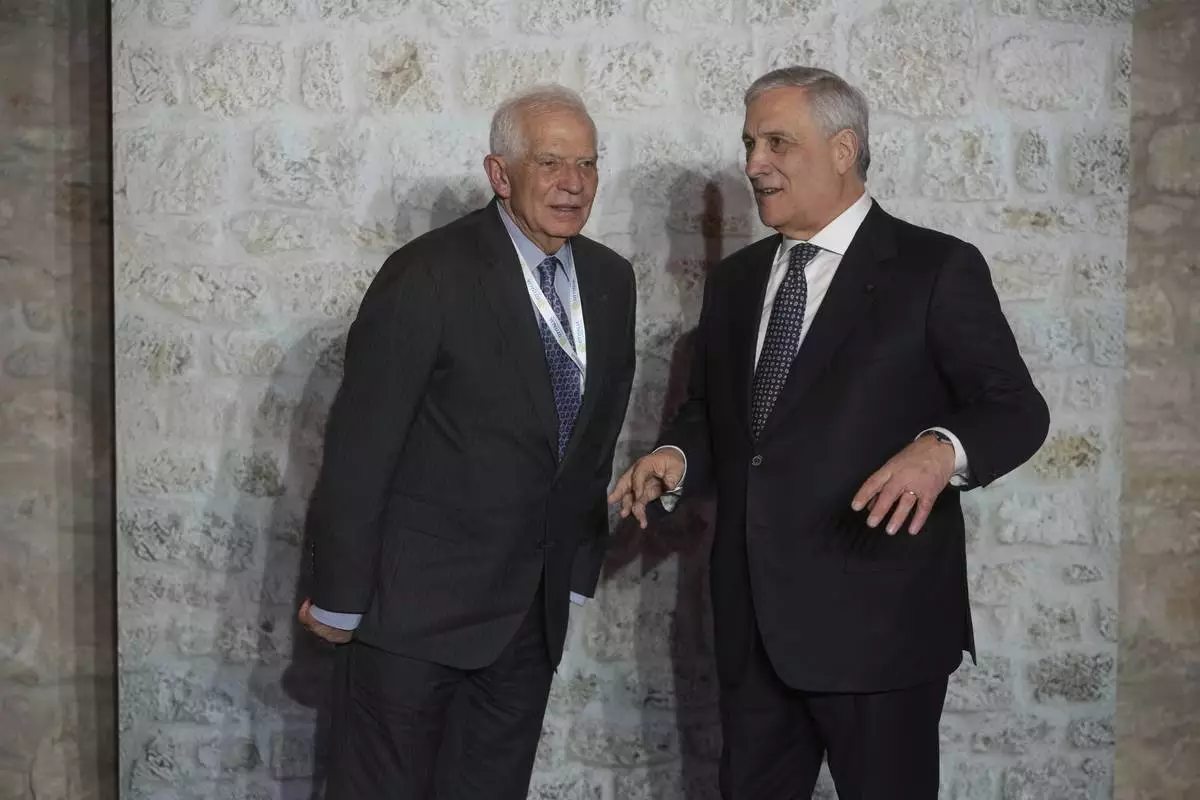
Italian Foreign Minister Antonio Tajani, right, and and European Union foreign policy chief Josep Borrell prepare for a family photo at the G7 of foreign Ministers in Anagni, some 70 kilometers south-east of Rome, Monday, Nov. 25, 2024. (AP Photo/Alessandra Tarantino)








































